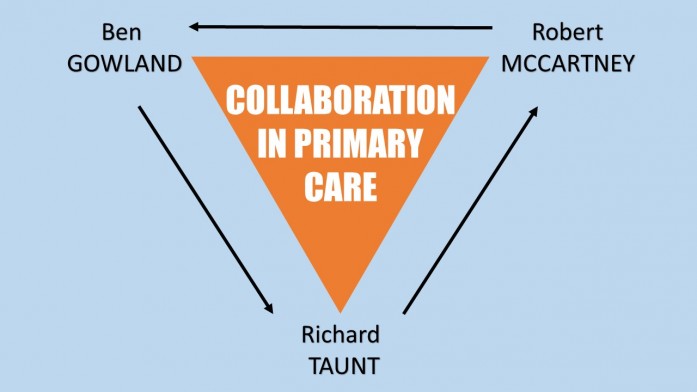Podcast: Play in new window | Download
Subscribe: Apple Podcasts | Email | RSS
This week we have a three-way conversation on the principles and practicalities of how to make collaborative working between practices happen. In one corner of the triangle we have Richard Taunt from Kaleidoscope Health and Care. Kaleidoscope is a social enterprise aiming to improve health through effective collaboration. In the second corner sits Ben Gowland who runs Ockham Healthcare, a consultancy supporting innovation in general practice and finally, pulling the conversation together is Robert McCartney of McCartney Healthcare Associates, experts in mergers and federation development. Struggling with collaboration in your area? Listen out for news of an exciting new six month training programme that could offer all the support and skills that you need.
Show Notes
Robert sets out the purpose of the discussion (1min 22secs)
Richard introduces Kaleidoscope and the importance of collaboration (2min 03secs)
Kaleidoscope’s “Melting Pot Lunches” (3mins 25secs)
The two big mistakes that practices make when they try and work together (4mins 38secs)
Form versus function and developing culture (7mins 16secs)
Building positive relationships requires rigour (8mins 12secs)
Deteriorating relationships between practices that don’t communicate (8mins 52secs)
Who should be leading collaboration? (10mins 08secs)
How does the system support collaboration? (11mins 03secs)
People in leadership roles don’t always have the skills or support (11mins 47secs)
The Collaboration in Primary Care programme – training and support for the leaders of collaboration (13mins 02secs)
How can you provide support? (14mins 17secs)
A six month programme – how to manage that? (14mins 43secs)
Only four days training but webinars, virtual content and access to expertise (15mins 24secs)
Acquiring these skills is the day job (16mins 02secs)
How much is the programme and how is it funded? (16mins 40secs)
Collaborative funding – sharing the costs brings the individual cost down (16mins 57secs)
More cost effective for individual health and social care systems (18mins 13secs)
Aimed at the areas tasked with supporting collaboration (19mins 03secs)
The diversity of the cohort strengthens the learning (19mins 35secs)
Find out more through a webinar on 30th June (20mins 31secs)
Getting more information (20mins 55secs)
The webinar to find out more about the Collaboration in Primary Care programme is being held on 30th June at 12pm. Details of how to register and more info can be found at http://www.collaborationfunder.org/primarycollab




